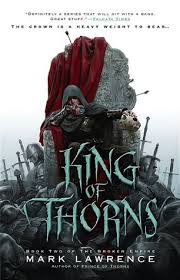
2‑King of Thorns
Chapter 28: Wedding day
by Mark, Lawrence,The chapter “Wedding Day” from *King of Thorns: Book Two of the Broken Empire* marks a pivotal moment in the narrative, focusing on the union of key characters amidst the turbulent backdrop of the Broken Empire. The wedding serves as both a political maneuver and a personal milestone, reflecting the intricate power dynamics at play. The ceremony is laden with tension, as alliances are forged and rivalries simmer beneath the surface, highlighting the fragile nature of loyalty in a world ruled by ambition and treachery.
The protagonist’s perspective dominates the chapter, offering insights into their conflicted emotions about the marriage. While the wedding is a strategic necessity, it also forces the character to confront personal vulnerabilities and unresolved past traumas. The juxtaposition of public celebration and private turmoil underscores the complexity of their role as a leader, torn between duty and desire. The chapter deftly explores the weight of crowns and the sacrifices demanded by power.
Surrounding the central event, the chapter weaves in subplots involving secondary characters, each with their own stakes in the wedding’s outcome. Friends and foes alike gather, their interactions laced with veiled threats and unspoken agendas. The atmosphere is thick with anticipation, as readers are left to wonder who will emerge victorious in the ensuing power struggles. The wedding day becomes a microcosm of the empire’s chaos, where every gesture carries hidden significance.
Ultimately, the chapter sets the stage for future conflicts, as the wedding’s aftermath promises to reshape the political landscape. The union, though celebrated, is far from harmonious, foreshadowing upheaval and betrayal. The author masterfully balances intimate character moments with broader thematic concerns, leaving readers eager to see how the newly forged bonds—and fractures—will influence the empire’s fate. The wedding day is not an end but a beginning, a catalyst for the next phase of the story’s unfolding drama.
FAQs
1. What is the significance of the chapter title “Wedding Day” in King of Thorns: Book Two of the Broken Empire?
Answer:
The chapter title “Wedding Day” likely signifies a pivotal moment in the narrative, possibly marking a major political or personal event for the protagonist, Jorg Ancrath. In the Broken Empire series, weddings often serve as strategic alliances rather than romantic unions, reflecting the brutal and calculating nature of the world. This chapter may explore themes of power, betrayal, or sacrifice, as Jorg navigates the complexities of leadership and relationships. The title hints at a ceremony that could alter the course of the story, either through unification or conflict.2. How does Jorg Ancrath’s character evolve in this chapter, and what challenges does he face?
Answer:
In this chapter, Jorg may confront internal and external challenges that test his ruthlessness and strategic acumen. Given his morally ambiguous nature, his evolution could involve grappling with the consequences of his actions or making difficult choices for his kingdom. The “Wedding Day” might force him to balance personal desires with political necessities, revealing vulnerabilities or hardening his resolve. Specific challenges could include betrayal, assassination attempts, or the weight of royal duties, all of which deepen his character complexity.3. Analyze the potential symbolism of a wedding in the context of the Broken Empire’s dark and violent setting.
Answer:
In the Broken Empire, a wedding is less about love and more about power dynamics, mirroring the series’ grim realism. Symbolically, it could represent forced unity, fragile alliances, or the cyclical nature of violence (e.g., marriages as tools for revenge or control). The ceremony might juxtapose traditional notions of hope and new beginnings with the harsh reality of Jorg’s world, where trust is scarce. The event could also serve as a metaphor for the binding of fates, with the “wedding” setting the stage for future conflicts or revelations.4. What role do secondary characters play in this chapter, and how do they influence Jorg’s decisions?
Answer:
Secondary characters, such as advisors, rivals, or the bride, likely act as catalysts for Jorg’s actions. For instance, a scheming noble or a reluctant bride could provoke tensions, forcing Jorg to assert dominance or adapt his plans. Allies like Makin or Katherine might offer counsel, testing his willingness to listen or defy. Their interactions reveal Jorg’s leadership style—whether he manipulates, eliminates, or collaborates with them. These dynamics underscore the chapter’s tension and drive the plot forward through alliances or betrayals.5. How might the events of “Wedding Day” foreshadow future conflicts in the Broken Empire series?
Answer:
The wedding could foreshadow unrest through subtle cues: a reluctant partner might hint at rebellion, or a disrupted ceremony could signal impending war. If the union is politically motivated, its fragility may preview betrayals or power struggles. Alternatively, the chapter might introduce a new faction or enemy disguised as a guest. The event’s aftermath—whether it strengthens Jorg’s position or exposes weaknesses—could set the tone for subsequent battles, both on the battlefield and in the realm of political intrigue.
Quotes
1. “The wedding day dawned bright and bloody, as all good days should.”
This opening line sets the tone for the chapter, blending celebration with violence—a hallmark of the book’s grimdark style. It immediately establishes the paradoxical nature of the event about to unfold.
2. “Love is just a weapon we turn on ourselves, and the sharpest blades cut both ways.”
A profound reflection on relationships in this brutal world, showing how even positive emotions become tools of destruction. This appears during the protagonist’s internal monologue about marriage.
3. “They came to see a wedding and got a war instead—such is the way of things when kings make merry.”
This pivotal quote marks the story’s turning point where celebration turns to conflict. It encapsulates the chapter’s central event while commenting on the unstable nature of power in this universe.
4. “Vows are just pretty lies we dress in ceremony.”
A cynical but crucial insight into the protagonist’s worldview, delivered during the wedding ceremony itself. This brief statement undermines the entire premise of the chapter’s central event.
